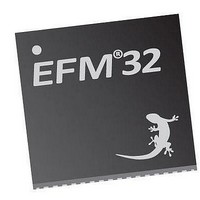EFM32TG210F32 Energy Micro, EFM32TG210F32 Datasheet - Page 143

EFM32TG210F32
Manufacturer Part Number
EFM32TG210F32
Description
MCU 32BIT 32KB FLASH 32-QFN
Manufacturer
Energy Micro
Series
Tiny Geckor
Specifications of EFM32TG210F32
Core Processor
ARM® Cortex-M3™
Core Size
32-Bit
Speed
32MHz
Connectivity
EBI/EMI, I²C, IrDA, SmartCard, SPI, UART/USART
Peripherals
Brown-out Detect/Reset, DMA, POR, PWM, WDT
Number Of I /o
24
Program Memory Size
32KB (32K x 8)
Program Memory Type
FLASH
Ram Size
4K x 8
Voltage - Supply (vcc/vdd)
1.8 V ~ 3.8 V
Data Converters
A/D 4x12b, D/A 1x12b
Oscillator Type
External
Operating Temperature
-40°C ~ 85°C
Package / Case
32-VQFN Exposed Pad
Processor Series
EFM32
Core
ARM Cortex-M3
Data Bus Width
32 bit
Data Ram Size
32 KB
Interface Type
UART, I2C, SPI
Maximum Clock Frequency
32 MHz
Number Of Programmable I/os
17
Number Of Timers
1
Operating Supply Voltage
1.8 V to 3.8 V
Maximum Operating Temperature
+ 85 C
Mounting Style
SMD/SMT
Processor To Be Evaluated
EFM32TG210
Lead Free Status / RoHS Status
Lead free / RoHS Compliant
Eeprom Size
-
Lead Free Status / Rohs Status
Details
- Current page: 143 of 522
- Download datasheet (9Mb)
14.3.1.3 Addresses
14.3.1.4 10-bit Addressing
2010-12-21 - d0034_Rev0.90
Examples of I
143) . The identifiers used are:
• ADDR - Address
• DATA - Data
• S - Start bit
• Sr - Repeated start bit
• P - Stop bit
• W/R - Read(1)/Write(0)
• A - ACK
• N - NACK
Figure 14.5. I
Figure 14.6. I
Figure 14.7. I
I
the START-condition contains the address of the slave the master wants to contact. In the 7-bit address
space, several addresses are reserved. These addresses are summarized in Table 14.1 (p. 143) , and
include a General Call address which can be used to broadcast a message to all slaves on the I
Table 14.1. I
To address a slave using a 10-bit address, two bytes are required to specify the address instead of
one. The seven first bits of the first byte must then be 1111 0XX, where XX are the two most significant
bits of the 10-bit address. As with 7-bit addresses, the eight bit of the first byte determines whether the
master wishes to read from or write to the slave. The second byte contains the eight least significant
bits of the slave address.
When a slave receives a 10-bit address, it must acknowledge both the address bytes if they match the
address of the slave.
2
S
I
0000-000
0000-000
0000-001
0000-010
0000-011
0000-1XX
1111-1XX
1111-0XX
2
C supports both 7-bit and 10-bit addresses. When using 7-bit addresses, the first byte transmitted after
C Address
ADDR
2
2
S
C Reserved I
2
2
2
C transfers are shown in Figure 14.5 (p. 143) , Figure 14.6 (p. 143) , and Figure 14.7 (p.
C Single Byte Write to Slave
C Double Byte Read from Slave
C Single Byte Write, then Repeated Start and Single Byte Read
W
ADDR
A
S
2
C Addresses
R/W
0
1
X
X
X
X
X
X
R
DATA
ADDR
A
W
...the world's most energy friendly microcontrollers
DATA
A
143
A
Sr
DATA
ADDR
A
Description
General Call address
START byte
Reserved for the C-Bus format
Reserved for a different bus format
Reserved for future purposes
Reserved for future purposes
Reserved for future purposes
10 Bit slave addressing mode
DATA
R
A
A
P
www.energymicro.com
DATA
N
P
2
C-bus.
N
P
Related parts for EFM32TG210F32
Image
Part Number
Description
Manufacturer
Datasheet
Request
R

Part Number:
Description:
KIT STARTER EFM32 GECKO
Manufacturer:
Energy Micro
Datasheet:

Part Number:
Description:
KIT DEV EFM32 GECKO LCD SUPPORT
Manufacturer:
Energy Micro
Datasheet:

Part Number:
Description:
BOARD PROTOTYPING FOR EFM32
Manufacturer:
Energy Micro
Datasheet:

Part Number:
Description:
KIT DEVELOPMENT EFM32 GECKO
Manufacturer:
Energy Micro
Datasheet:

Part Number:
Description:
MCU, MPU & DSP Development Tools TG840 Sample Kit
Manufacturer:
Energy Micro
Datasheet:

Part Number:
Description:
MCU, MPU & DSP Development Tools TG Starter Kit
Manufacturer:
Energy Micro
Datasheet:

Part Number:
Description:
MCU, MPU & DSP Development Tools TG108 Sample Kit
Manufacturer:
Energy Micro

Part Number:
Description:
MCU, MPU & DSP Development Tools TG210 Sample Kit
Manufacturer:
Energy Micro
Datasheet:

Part Number:
Description:
MCU, MPU & DSP Development Tools TG822 Sample Kit
Manufacturer:
Energy Micro
Datasheet:

Part Number:
Description:
MCU, MPU & DSP Development Tools TG230 Sample Kit
Manufacturer:
Energy Micro

Part Number:
Description:
SAMPLE KIT (SMALL BOX - CONTAINING 2 DEVICES)
Manufacturer:
Energy Micro

Part Number:
Description:
SAMPLE KIT (SMALL BOX - CONTAINING 2 DEVICES)
Manufacturer:
Energy Micro










